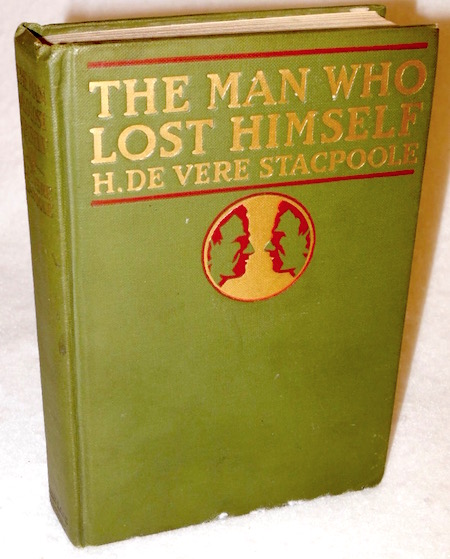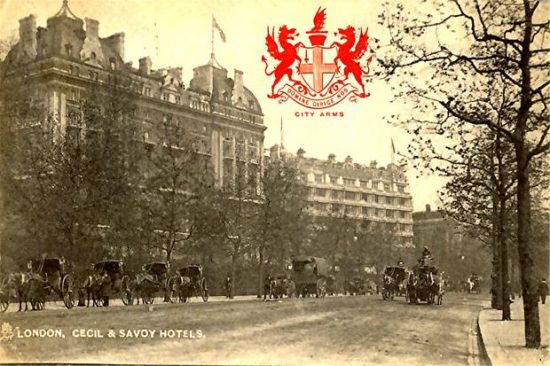THE MAN WHO LOST HIMSELF (1)
By:
January 22, 2018

This year marks the 100th anniversary of a forgotten Avenger/Artful Dodger-type adventure novel, The Man Who Lost Himself. A man down on his luck wakes up after a drunken night in London only to discover… that he has somehow slipped into the identity of a wealthy aristocrat! HiLoBooks is pleased to serialize this funny, thrilling yarn by H. De Vere Stacpoole — best known as author of The Blue Lagoon — here at HILOBROW.

It was the first of June, and Victor Jones of Philadelphia was seated in the lounge of the Savoy Hotel, London, defeated in his first really great battle with the thing we call life.
Though of Philadelphia, Jones was not an American, nor had he anything of the American accent. Australian born, he had started life in a bank at Melbourne, gone to India for a trading house, started for himself, failed, and become a rolling stone. Philadelphia was his last halt.
With no financial foundation, Victor and a Philadelphia gentleman had competed for a contract to supply the British Government with Harveyised steel struts, bolts, and girders; he had come over to London to press the business; he had interviewed men in brass hats, slow moving men who had turned him over to slower moving men. The Stringer Company, for so he dubbed himself and Aaron Stringer, who had financed him for the journey, had wasted three weeks on the business, and this morning their tender had been rejected. Hardmans’, the Pittsburg people, had got the order.
It was a nasty blow. If he and Stringer could have secured the contract, they could have carried it through all right, Stringer would have put the thing in the hands of Laurenson of Philadelphia, and their commission would have been enormous, a stroke of the British Government’s pen would have filled their pockets; failing that they were bankrupt. At least Jones was.
And justifiably you will say, considering that the whole business was a gigantic piece of bluff — well, maybe, yet on behalf of this bluffer I would put it forward that he had risked everything on one deal, and that this was no little failure of his, but a disaster, naked and complete.
He had less than ten pounds in his pocket and he owed money at the Savoy. You see he had reckoned on doing all his business in a week, and if it failed — an idea which he scarcely entertained — on getting back third class to the States. He had not reckoned on the terrible expenses of London, or the three weeks delay.
Yesterday he had sent a cable to Stringer for funds, and had got as a reply: “Am waiting news of contract.”
Stringer was that sort of man.
He was thinking about Stringer now, as he sat watching the guests of the Savoy, Americans and English, well to do people with no money worries, so he fancied. He was thinking about Stringer and his own position, with less than ten pounds in his pocket, an hotel bill unreceipted, and three thousand miles of deep water between himself and Philadelphia.
Jones was twenty-four years of age. He looked thirty. A serious faced, cadaverous individual, whom, given three guesses you would have judged to be a Scotch free kirk minister in mufti; an actor in the melodramatic line; a food crank. These being the three most serious occupations in the world.
In reality, he had started life, as before said, in a bank, educated himself in mathematics and higher commercial methods, by correspondence, and, aiming to be a millionaire, had left the bank and struck out for himself in the great tumbling ocean of business.
He had glimpsed the truth. Seen the fact that the art of life is not so much to work oneself as to make other people work for one, to convert by one’s own mental energy, the bodily energy of others into products or actions. Had this Government contract come off, he would have, and to his own profit, set a thousand hammers swinging, a dozen steel mills rolling, twenty ships lading, hammers, mills and ships he had never seen, never would see.
That is the magic of business, and when you behold roaring towns and humming wharves, when you read of raging battles, you see and read of the work of a comparatively small number of men, gentlemen who wear frock coats, who have never handled a bale, or carried a gun, or steered a ship with their own hands. Magicians!
He ordered a whisky and soda from a passing attendant, to help him think some more about Stringer and his own awful position, and was taking the glass from the salver when a very well dressed man of his own age and build who had entered by the passage leading up from the American bar drew his attention.
This man’s face seemed quite familiar to him, so much so that he started in his chair as though about to rise and greet him. The stranger, also, seemed for a second under the same obsession, but only for a second; he made a half pause and then passed on, becoming lost to sight beyond the palm trees at the entrance. Jones leaned back in his chair.
“Now, where did I see that guy before?” asked he of himself. “Where on earth have I met him? and he recognised me — where in the — where in the — where in the — ?”
His memory vaguely and vainly searching for the name to go with that face was at fault. He finished his whisky and soda and rose, and then strolled off not heeding much in what direction, till he reached the book and newspaper stand where he paused to inspect the wares, turning over the pages of the latest best seller without imbibing a word of the text.
Then he found himself downstairs in the American bar, with a champagne cocktail before him.
Jones was an abstemious man, as a rule, but he had a highly strung nervous system and it had been worked up. The unaccustomed whiskey and soda had taken him in its charge, comforting him and conducting his steps, and now the bar keeper, a cheery person, combined with the champagne cocktail, the cheeriest of drinks, so raised his spirits and warmed his optimism, that, having finished his glass he pushed it across the counter and said, “Give me another.”
At this moment a gentleman who had just entered the bar came up to the counter, placed half a crown upon it and was served by the assistant bar keeper with a glass of sherry.
Jones, turning, found himself face to face with the stranger whom he had seen in the lounge, the stranger whose face he knew but whose name he could not remember in the least.
Jones was a direct person, used to travel and the forming of chance acquaintanceships. He did not hang back.
“ ’Scuse me,” said he. “I saw you in the lounge and I’m sure I’ve met you somewhere or another, but I can’t place you.”
SERIALIZED BY HILOBOOKS: Jack London’s The Scarlet Plague | Rudyard Kipling’s With the Night Mail (and “As Easy as A.B.C.”) | Arthur Conan Doyle’s The Poison Belt | H. Rider Haggard’s When the World Shook | Edward Shanks’ The People of the Ruins | William Hope Hodgson’s The Night Land | J.D. Beresford’s Goslings | E.V. Odle’s The Clockwork Man | Cicely Hamilton’s Theodore Savage | Muriel Jaeger’s The Man With Six Senses | Jack London’s “The Red One” | Philip Francis Nowlan’s Armageddon 2419 A.D. | Homer Eon Flint’s The Devolutionist | W.E.B. DuBois’s “The Comet” | Edgar Rice Burroughs’s The Moon Men | Charlotte Perkins Gilman’s Herland | Sax Rohmer’s “The Zayat Kiss” | Eimar O’Duffy’s King Goshawk and the Birds | Frances Hodgson Burnett’s The Lost Prince | Morley Roberts’s The Fugitives | Helen MacInnes’s The Unconquerable | Geoffrey Household’s Watcher in the Shadows | William Haggard’s The High Wire | Hammond Innes’s Air Bridge | James Branch Cabell’s Jurgen | John Buchan’s “No Man’s Land” | John Russell’s “The Fourth Man” | E.M. Forster’s “The Machine Stops” | John Buchan’s Huntingtower | Arthur Conan Doyle’s When the World Screamed | Victor Bridges’ A Rogue By Compulsion | Jack London’s The Iron Heel | H. De Vere Stacpoole’s The Man Who Lost Himself | P.G. Wodehouse’s Leave It to Psmith | Richard Connell’s “The Most Dangerous Game” | Houdini and Lovecraft’s “Imprisoned with the Pharaohs” | Arthur Conan Doyle’s “The Sussex Vampire.”
RADIUM AGE SCIENCE FICTION: “Radium Age” is HILOBROW’s name for the 1904–33 era, which saw the discovery of radioactivity, the revelation that matter itself is constantly in movement — a fitting metaphor for the first decades of the 20th century, during which old scientific, religious, political, and social certainties were shattered. This era also saw the publication of genre-shattering writing by Edgar Rice Burroughs, Sax Rohmer, E.E. “Doc” Smith, Jack London, Arthur Conan Doyle, Aldous Huxley, Olaf Stapledon, Karel Čapek, H.P. Lovecraft, Charlotte Perkins Gilman, Yevgeny Zamyatin, Philip Gordon Wylie, and other pioneers of post-Verne/Wells, pre-Golden Age “science fiction.” More info here.
READ GORGEOUS PAPERBACKS: HiLoBooks has reissued the following 10 obscure but amazing Radium Age science fiction novels in beautiful print editions: Jack London’s The Scarlet Plague, Rudyard Kipling’s With the Night Mail (and “As Easy as A.B.C.”), Arthur Conan Doyle’s The Poison Belt, H. Rider Haggard’s When the World Shook, Edward Shanks’ The People of the Ruins, William Hope Hodgson’s The Night Land, J.D. Beresford’s Goslings, E.V. Odle’s The Clockwork Man, Cicely Hamilton’s Theodore Savage, and Muriel Jaeger’s The Man with Six Senses. For more information, visit the HiLoBooks homepage.
